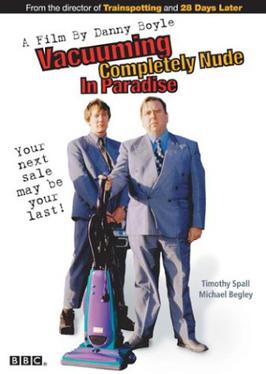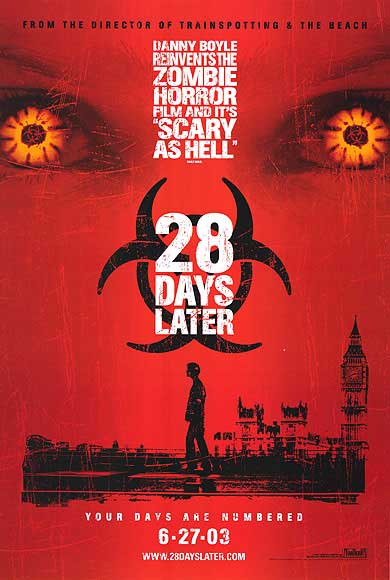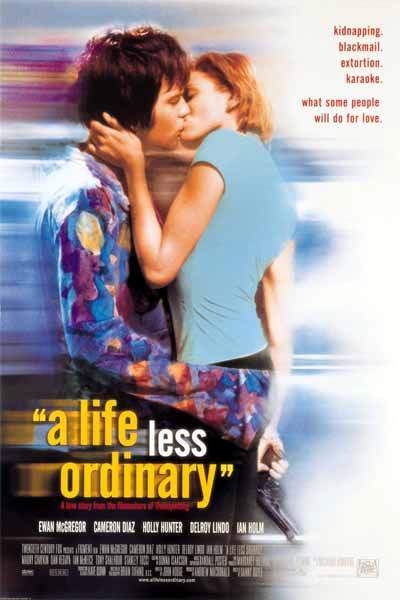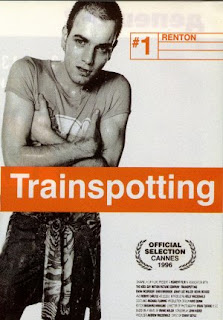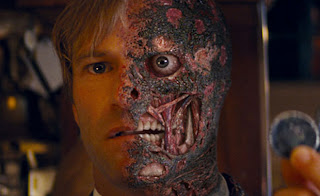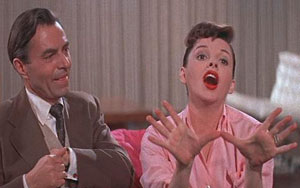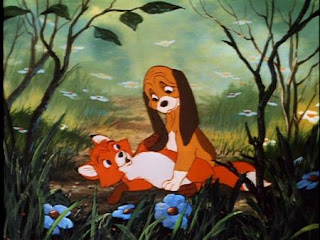 To celebrate Danny Boyle directing the Opening Ceremony for London
Olympics 2012, over the next couple of days, I will be charting the career of
one of Britains top director...
To celebrate Danny Boyle directing the Opening Ceremony for London
Olympics 2012, over the next couple of days, I will be charting the career of
one of Britains top director...So, following the success of 28 Days Later, this time Boyle didn't let it go to his head. He had no cast members that he would stick-with indefinately (though we would see Cillian Murphy again). No sell-out action-films (e.g. directing a sequel - though he played a role as producer of 28 Weeks Later he didn't direct and Alex Garland didn't write it). Instead, Boyle stayed small scale, stretching his talent further. He had tackled the drug-fuelled adrenaline and dance-scene in Trainspotting, he had tackled horror with 28 Days Later and he had even tried the Hollywood blockbuster with an A-List actor with . Next, he made a British Children's film rooted in Catholic Saints and with a strong moral centrepoint ...
 Millions (2004)
Millions (2004)
With nine producers and executive producers (none of which were Andrew MacDonald), Boyle seemed to use most of his crew from 28 Days Later... with Anthony Dod Mantle, Chris Gill and John Murphy on board. Frank Cottrell Boyce wrote the script - a writer who denies the neccessity of structure in a script. Does it have to be three acts? Not really. And I wouldn't scoff at such modern thinking as he won an award at the British Independent Film Awards for Best Screenplay! Millions is the story about a young boy and his brother, who have lost their Mother. It is set within the context of the fictional-scenario of England joining the Euro and, amongst it all, a huge bag of money - at least £1million - is thrust into the two boys lives. John Murphy, with a great ear for sound, even used two tracks by Muse on the soundtrack. Certain skills were gained in Boyle's direction of the children and the start of the film - as the two kids run around their future house as it builds itself around them - is inspired and sets a fast-pace to film. A similar technique to the front-of-car credits in Shallow Grave and the 'Lust for Life' sequence at the start of Trainspotting.
Roger Ebert and Richard Roeper both claimed it as one of the best films of the year. Perhaps inevitably, the Christian-community supported the film - though there is always one who complained about the 'menace' and 'violence' in the film. Indeed, if you like Slumdog Millionnaire, you will love Millions. Vastly underrated, Millions is a must-watch that may even bring a tear to your eye ... because it did bring a tear to mine.
 Sunshine (2007)
Sunshine (2007)But alas, the big-budget nature of a blockbuster lured Boyle back - this time to a different genre: Science Fiction. Danny Boyle has stated that all directors inevitably 'do' their Sci-Fi film. Stanley Kubrick and 2001: A Space Odyssey comes to mind, Ridley Scott - now more known for his epics and action films - obviously has roots in Sci-Fi with Blade Runner and Alien. And now Prometheus. The two types boil down to the action-sci-fi, such as Star Wars and Star Trek. Then there are the 'serious' science-fiction that inevitably focuses on faith (tick Danny Boyle atribute number 1...) and humanity. These, more often than not include the 'machine' - Mother in Alien and HAL in 2001 - and a 'signal'...
Alex Garland wrote the script, with a missing space craft already in orbit, another space craft - Icarus II - flys out to 'deliver the payload' and reignite the sun. A sun, which is dying. As Icarus II gets closer to the sun, it picks up a signal from the first space craft, Icarus. An outstanding film, with fascinating visuals - clear colour schemes in every sequence - the warmth of the 'sun' room, the cool blues and greens of the 'oxygen-creating' room. An outstanding cast in Michelle Yeah, Captain America in Chris Evans, Rose Byrne and star-of-The-Last-Samurai (no, not Tom Cruise) Hiroyuki Sanada. Cillian Murphy played the lead - the lucky charm of 28 Days Later... and, lo and behold, some great reviews but disapointing box-office returns. The budget was $40m but the gross revenue managed to gain only $32m. Personally, I have decided that in many of Boyle's film, there is always an exceptionally awkward moment whereby you feel a little uncomfortable and I have found that this is simply what Boyle wants you to feel. Examples of these moments would include the 'madness' of McGregor in Trainspotting seeing babies on the roof, whilst DiCaprio's madness is equally strange in The Beach. Sunshine switches from its sci-fi roots to a slasher movie in the final moment - Mark Strong playing the murderous Pinbacker (which, on the first watch, is jarring). It feels as if it doesn't make complete sense - though is Pinbacker real or a figment of their mind? should it make sense? Indeed, does faith make sense? Sunshine is one of Boyle's finest efforts - add to this John Murphys collaboration with Underworld (musicians behind Trainspotting's 'Born Slippy', the soundtrack on Sunshine was even used on Kick-Ass) on the soundtrack, and you have a fascinating work of art.
This post was originally released on 16th July 2010, but has been adapted to cover his recent film releases and provide a 'Part 5', to an originally only 4-part series.


